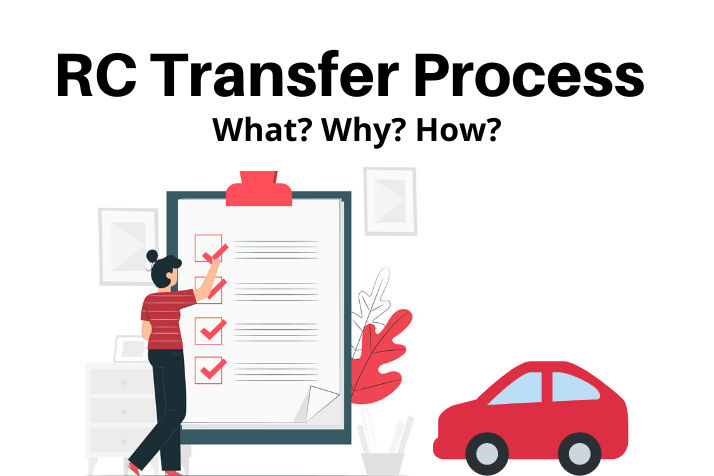The Complete RC Transfer Process

The RC transfer, also known as the ownership transfer process, is one of the most important tasks you need to accomplish once you have decided to sell your car. It is important as according to the ruling of the Supreme Court, all the legal and financial liabilities related to a vehicle will continue to lie with the seller until the registration certificate (RC) of the car has the name of the new owner on it. It essentially means that even after selling the car, you will be held liable for losses till the time your vehicle’s RC is transferred in the name of the new buyer.
Having described the importance of the RC transfer, we now shift our focus to the process of RC transfer – what needs to be done in order to transfer the RC, what are the documents required to complete the transfer process, and approximately how much time the Regional Transport Office (RTO) takes to complete the process. Here are the details:
1) Intimation to the RTO: It is recommended that within 14 days of the sale of your vehicle, you must apply for the RC transfer at the concerned RTO. You have to intimate RTO about the sale of your car and need to submit an application along with the requisite documents (details given ahead in the article) for processing the request for the ownership transfer process. Remember, the time frame of 14 days is crucial as delay in this regard will attract financial penalties and legal trouble.
2) What are the documents required for the RC transfer process? Following are the documents you need to submit along with an application form to the RTO office for processing of your ownership transfer request:
a) Registration Certificate (RC): You need to submit the original RC by the name of the seller to RTO.
b) Form 29: This form is a notice form of the transfer of ownership of the vehicle and needs to be submitted to the RTO office along with a passport size photograph of both buyer and seller. The form should be duly signed by both seller and buyer.
c) Form 30: This form is a report of the transfer of the ownership of a vehicle and like form 29; it needs to be submitted to the RTO office with a passport size photograph of both buyer and seller. Again, it has to be duly signed by both parties failing which your application will not be processed.
d) Form 28: Form 28 is a No Objection Certificate (NOC) and it will be required if the ownership transfer has to be done in the jurisdiction of another state. In other words, you have sold the car interstate with the buyer belonging to a different state RTO. It’s important to note Form 28 might not be required if you sell the car from one city to another city within a state; however, exceptions do exist with some states like Maharashtra making it mandatory to have Form 28 even in case of an intercity transfer. In sum, Form 28 is mandatorily required in case of the interstate RC transfer process.
e) Valid insurance and Pollution Under Control certificate: RC transfer process requires you to submit valid insurance and Pollution Under Control certificate along with the original RC to the RTO.
f) National Crime Records Bureau (NCRB) Report: In case of an interstate transfer, you are required to attach the NCRB report with the application of the RC transfer. This report certifies that the vehicle hasn’t been involved in any criminal or anti-social activities.
3) What is the RTO fee for processing the ownership transfer? Along with the required documents, you need to pay a fee to the RTO for processing your ownership transfer application. The fee is around Rs 300 for a car although it varies from state to state albeit marginally.
4) How much time does the RC transfer take? Thanks to the enhanced use of technology, the RC transfer doesn’t take a long time to complete. In fact, some RTOs claim to complete the ownership transfer within seven working days. However; on average around 20 to 30 days are required for the RC transfer and in case of an interstate transfer, you need to approach two different RTOs ( one of the seller and one of the buyer) to complete the process.
5) How can I check the status of the RC transfer Process? You can check the status of your RC and its particulars on the website of the Ministry of Road Transport and Highways, https://parivahan.gov.in/parivahan/en. Click on the tab of RC status lower down the page to know the status of your RC. You just need to fill in the vehicle number and verification code (shown on the page) to get the current status of the RC. Alternatively, you can SMS VAHAN to 7738299899 to receive the details of the RC.
CarDekho Gaadi RC Transfer Advantage: Undoubtedly, getting the RC transfer done is a hefty task and requires a number of follow-ups with RTOs. You can take the help of an agent but then have to pay good money to get the things done. A better alternative, however, is to sell your car at CarDekho Gaadi Store where you not only get the best price for your vehicle but can also avail the free RC transfer facility offered by them. So what you are waiting for, go ahead, and book your appointment today to experience an all-new way of selling your used car.
Also Read:- How to Renew RC if it is Expired